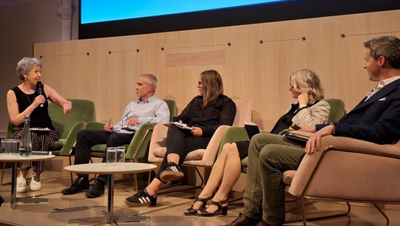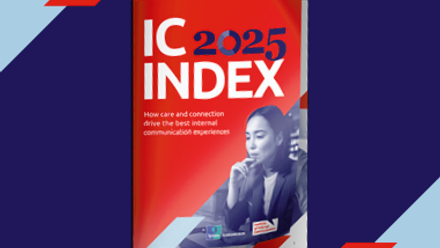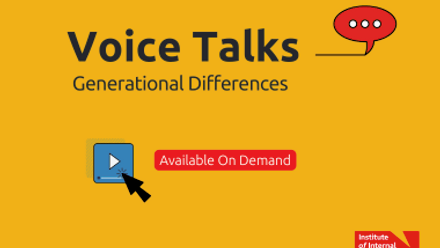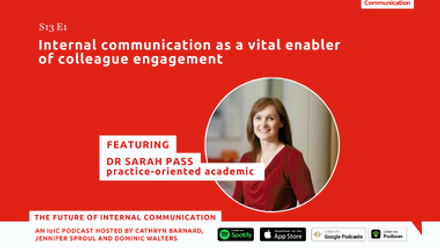In July, the UK witnessed the election of a new government. After years of austerity and social and economic decline, there’s a tangible hopefulness in the air for what a new administration might bring.
Various industry trade bodies and institutions used the 2024 General Election to set out their hopes for and expectations of a new government. The IoIC published its own call for action, urging the prioritisation of internal communication as a key driver of economic growth.
All-volunteer movement Engage for Success (E4S) was another community keen to seize the moment. Proactively promoting employee engagement as benefiting individuals, teams and their organisations, it marked the new government by hosting a symposium titled Engage to Grow: Transforming the UK economy through employee engagement.

The IoIC’s CEO Jennifer Sproul was invited to a panel discussion to support the symposium.
Employee voice is one of four enablers identified by David MacLeod and Nita Clarke in their 2008 UK-Government commissioned research into the impact of employee engagement on organisational performance.
The symposium set out to reiterate the crucial role of employee engagement in sustainable economic recovery and growth. A change of government is after all, an apt moment to reflect on current levels of UK workforce engagement.
UK engagement in 2023
In December 2023, E4S used an agnostic platform to survey 3,000 UK workers. The primary benefit of gathering data in this way is that employees aren’t linked to their employers and therefore more likely to openly express their views.
The research showed a generalised level of apathy towards work that places the UK behind most other European countries. According to research produced by Gallup earlier in 2023, the UK lagged in 33rd place out of 38 countries across Europe for workforce engagement. 2024 Gallup data shows no improvement. According to Personnel Today, only 10% of UK workers are now engaged and low engagement costs the UK over £257 billion annually.
E4S’s 2023 research shows self-reported levels of engagement to be 8% lower than pre-COVID levels.
Workplace indifference is hugely detrimental. It affects morale and motivation and inhibits productivity and innovation. It also slows down the pace of business transformation – something no employer can afford when navigating the tumultuous 2020s.
The E4S research shows that too few employers are prioritising their people when making organisational decisions. This negatively impacts engagement and productivity.
What can organisations do to address the engagement lag?
So, how can organisations address the engagement lag? And more importantly, what can internal communicators help their organisations do?
Paul Drechsler CBE, Chair of the International Chamber of Commerce, opened the E4S symposium, providing much food for thought.
Drechsler first acknowledged the flagging state of the UK economy. But he then used this to underscore that engagement solutions needn’t be costly. He earmarked hopeful, inspiring narratives as the single most important thing any organisation can create right now.
The 2008 global financial crash, austerity, economic floundering, Brexit, COVID-19, political infighting, ongoing cost-of-living challenges and the escalating climate emergency – no wonder people feel unsettled, anxious and in too many cases, nearing burnout.
To reignite engagement at work, we all urgently need a compelling and credible vision for the future.
Macleod and Clarke’s 2008 research found a well-crafted strategic narrative offers a story of hope that internal stakeholders can emotionally get behind. The narrative itself must of course include the very people whose contribution will bring that future into reality. Not always easy when AI and stories of workless, automated futures are never far from the news.
Drechsler made clear however that recognition of work well done sits at the heart of successful organisational collaboration, innovation and performance. This of course relies heavily on effective internal communication.
In her panel conversation, Jennifer Sproul was joined by Ben Wilmott, Head of Public Policy for the CIPD, Susan Clews, CEO of ACAS and David Dagger, Director of Communication and Corporate Affairs for the Institute of Customer Service. She took the opportunity to reinforce the vital role of internal communication in organisational effectiveness.
Building on Drechsler’s comments, Jen called for the new government to create an inclusive, equitable economic narrative that instils hope across the country for a better tomorrow.
When organisations can pin their own strategies to a national narrative of recovery, improvement and advancement for the many rather than the few, it’s immediately easier to restore engagement levels at work. We have a collective purpose to focus on.
Flagging engagement currently affects every corner of the UK economy.
It’s clear the four enablers of engagement, originally identified by MacLeod and Clarke fifteen years ago, still hold true today. Furthermore, they are reflected in the findings of the 2024 IC Index research, and they reinforce the business case for investment in internal communication.
Let’s quickly revisit these.
- Strategic narrative – Leaders must consistently uphold a coherent, accessible narrative about their organisation, its priorities, its history, where it plans to get to and how. Furthermore, it’s vital colleagues understand how their individual contribution fits into the strategy. The 2024 IC Index shows a 35-point jump in belief in the organisational strategy when internal stakeholders know how they personally can contribute towards it.
- Engaging managers – People-oriented managers set clear objectives and boost engagement by showing how work tasks help deliver the business strategy. They recognise contribution and help each team member fulfil their potential. The 2024 IC Index shows the importance of line manager support and understanding. Colleagues want to feel included and heard in organisational conversations. Open and regular communication with line-managers boosts trust and organisational performance.
- Employee voice – Where internal stakeholders are seen as integral to effective organisational problem-solving, engagement accelerates. When colleague perspectives are integrated into decision-making, performance improves. The 2024 IC Index highlights how regular, inclusive communication at work seeds and enhances trust throughout the wider organisation.
- Organisational integrity – E4S defines this as the consistently visible alignment between an organisation’s values and the day-to-day behaviour of its leader and managers. The 2024 IC Index shows the importance of seeing managers and leaders’ behaviour align with values and the impact misalignment has on trust.
Internal communication is key to engagement
All organisations, regardless of industry or sector, face myriad challenges.
AI, the climate crisis, shifts in consumer attitudes and behaviour, skills shortages, supply-chain challenges and a rapidly evolving labour market – there are no shortage of issues needing urgent attention.
But low internal engagement – or worse, active disengagement – is a problem that CAN be remedied.
And it starts with improving internal communication and authentic, accessible, transparent and humane leadership and management practices. This is THE work. It isn’t costly but it does take daily commitment and practice.
As internal communicators, this is the opportunity of a lifetime.
To help primary stakeholders update and improve their communication styles will deliver immeasurable strategic value. What an opportunity to help boost organisational performance.







